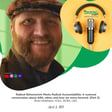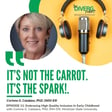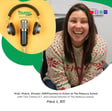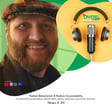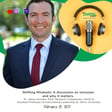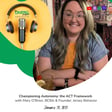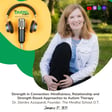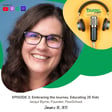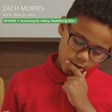The Impact of Analytical Processes on Diverse Learners
00:00:00
Speaker
One question that comes up a lot is if I as a classroom teacher
00:00:13
Speaker
with all of my students, will I be doing any disservice to a child who happens to be using an analytic process?
00:00:24
Speaker
And the answer is, from what we know so far, every child recognizes the meaningfulness of something before the skill itself.
Introduction to Diverge Podcast and Autism Acceptance
00:00:38
Speaker
Welcome to the Diverge podcast. Inclusive of autistic and other neurodivergent voices, we exist to bridge the gap between specialized knowledge and everyday parenting. We are on a mission to bring together the most forward-thinking experts who are deep in the trenches, championing neuroaffirming and developmentally based approaches to therapy, to education, and life.
00:01:00
Speaker
Designed for parents, educators, friends, and allies. Conversation by conversation, insight by insight. We are building community and making space for all kinds of minds.
00:01:12
Speaker
Hi everyone, welcome to the Diverge podcast. Today is April 2nd, Autism Acceptance Day. And in honor of this important day, as your feeds are lighting up red, I'm sharing an episode that is incredibly meaningful to both me and to my family.
00:01:26
Speaker
Our guest today is Marge Blanc. She is a renowned speech and language pathologist with decades of experience and the author of Natural Language Acquisition. Her work has been truly life-changing for us.
Marge Blanc's Natural Language Acquisition Framework
00:01:38
Speaker
Before we jump in, let's talk through a few terms. The first is natural language acquisition. NLA is a framework that was developed by Marge, and it outlines how Gestalt processors acquire and develop language.
00:01:51
Speaker
It includes 6 different stages, which we'll talk about in the podcast. And it's all about moving towards self-generated and flexible grammar for people who process things, not necessarily word by word, but in meaningful chunks.
00:02:05
Speaker
Gestalt language processing refers to a style or a way that people process or acquire language. Gestalt processors learn and express language in whole phrases or scripts first, rather than one word at a time.
00:02:19
Speaker
Over time with support, these scripts are eventually broken down into smaller parts and recombined into original spontaneous language. I was first introduced to the concept of gestalt language processing during a speech evaluation at a new clinic.
00:02:33
Speaker
For the first time, I understood why certain phrases came so easily to my son, yet conversational language still felt out of reach. It was a revelation and one that eventually would lead us to a set of tools that changed everything.
00:02:46
Speaker
A few years later, we were matched with a rock star SLP who used the principles of NLA. And as she did, I watched my son's communication blossom, moving from stage one to stage four in just a few months.
00:02:58
Speaker
As with many developmentally based approaches, NLA gave us something so precious, and that was permission.
Personal Insights and Joyful Communication
00:03:04
Speaker
Permission to continue to follow my son's lead, to continue to prioritize joy, to continue to follow his interests, but also to stop stressing about whether he can answer questions or hold a back and forth exchange.
00:03:15
Speaker
Not because we didn't want those things for him, but because we now understood he simply wasn't there yet. And that was okay. This episode is just the beginning of a window into a growing movement called Total Communication.
00:03:29
Speaker
The Total Communication movement is a philosophy and approach that embraces all forms of communication, not just spoken language, to support expression, connection, understanding, especially for autistic individuals and those with diverse communication needs.
00:03:44
Speaker
It can include, but is not limited to speech, gestalt language and scripting, echolalia, AAC, sign language, body language, facial expressions, gesture, tone, rhythm, art, writing, and even movement.
Understanding Total Communication and Listener Engagement
00:03:57
Speaker
I hope to cover this more in the future, but today we're focusing primarily on gestalt language processing and natural language acquisition. As you listen, I really hope this brings you the clarity that it brought us. And if you have any questions, please feel free to reach out and we will work on getting those questions answered. We're on Instagram. You can reach out over email.
00:04:16
Speaker
ah There's plenty of places to find us. So excited for this episode. So let's dive in.
Marge Blanc's Background in Gestalt Language Processing
00:04:22
Speaker
but Well, hi, everyone. Welcome to the Diverge podcast. Today we are chatting with Marge Blanc. She is the famed SLP and author of Natural Language Acquisition, which for those of you who are familiar, um talks about how to support gestalt language processors and has been revolutionary in my house.
00:04:42
Speaker
So I'm going to let Marge introduce herself and talk a little bit about the work she does and why it's so important to her.
00:04:50
Speaker
Well, thank you so much for the introduction. um i would say that When I started out as an SLP, um I worked a lot with ah school districts in United States and in Canada.
00:05:08
Speaker
And honestly, I did not know anything about Gestalt language processing until I came back to the States um and it was in Wisconsin. And a friend of mine was the clinic director at the and University of Wisconsin in Madison and asked me if I would fill in for three years in a position that was working with you know grad students in the clinic, but it was with little kids and as clients. And I said, yeah, of course.
Applied Behavior Analysis vs. Gestalt Language Methods
00:05:39
Speaker
And when I began, there was a big ABA push in Wisconsin at the time because one of the well-meaning psychologists here decided to replicate the early LOVAS study and decided to get rid of and autism to have all kids be and to have all kids b
00:06:10
Speaker
identical to yeah to each other. yeah And then so, you know, that was that was my beginning. And that was 1993. at that time, if you were kid and you were in that program and you didn't excel the way you were expected to you were considered a, and kid you not, Lovas failure. Ooh.
00:06:37
Speaker
So the idea of having any other way of developing language was, you know, just not a part of anyone's thinking.
Echolalia's Role in Language Development
00:06:45
Speaker
Now, I know that, you know, as we talk about some of the history behind understanding Gestalt language processing, there was a lot that Barry Presund and Amy Weatherby and all kinds of other people or doing still in 1993. You know, Barry Prezant's work was from nineteen you know the early seventy s and 80s. The article that he wrote in 1983 was really putting together the first four stages of natural language acquisition when you start with echolalia.
00:07:22
Speaker
yeah And just to jump ahead to one of your other questions, the reason we don't want to extinguish equilayality, you know, we have many, many reasons. You know, we're um going to just change this poor little person's life to say that your natural language is not adequate.
00:07:40
Speaker
It's not accepted here. That's, of course, the first reason. And there's no way you can really establish a really close relationship. personal, emotionally tied relationship if you say that to a child. You know, all those, you know, subtle compliance things.
00:07:57
Speaker
illness You know, you know, oh, that's kind of cute, but you could say, you know, something else. So, but also... What we know from the work of Barry Prezant from those years before is that echolalia, delayed echolalia, as we call it, the stuff that you say again later, is the first stage of language development. Yes.
00:08:23
Speaker
It's the first stage of Gestalt language development and so if we try to or anybody tries to extinguish it, it not only says to the child that they're wrong, right but it just stops that language development in its tracks.
00:08:36
Speaker
Yes, no, and we definitely saw that um at my house.
Familial Connections to Gestalt Processing
00:08:40
Speaker
of What was so interesting though is I found out in retrospect ah that my husband was actually a GLP as a kid, which I mean, I guess it would mean he still is now.
00:08:50
Speaker
But I remember talking to my sister-in-law, i think my mother-in-law, when we first started going back and forth about this, my mother-in-law was like, oh yeah, Tommy didn't talk till was four. And my sister-in-law was like, na no, no, no, no.
00:09:02
Speaker
he made up his own words. And I was like, oh, the this was could have been helpful information six months ago. He also happens to be the king of movie quotes, even still.
00:09:15
Speaker
So um there was a lot about what we did with my son in the beginning. like it wasn't like I never realized he spoke in echolalia because I just thought he was quoting movie lines because his dad does that sometimes. It made sense to us.
00:09:28
Speaker
ah But so it's such, it's fascinating work. So excited to get a little bit more into that. um But before we do, I do have a question I love to ask people just to sort of ground philosophically.
The Need for Gestalt Language in Education
00:09:39
Speaker
um If you could wave a magic wand and change anything about this space and the world as it relates to neurodivergence or language acquisition in this case, what would it be?
00:09:49
Speaker
Well, you know, the people who know me really well know that my only goal right now in life. And i'm by the way, I plan to live for another 20 years.
00:10:01
Speaker
mean, you might look at me and say, oh, I think you might be close to 80 years old. nice should But i know my mother lived to be 100. And my mother felt that the reason I was born, truly, she said this, is to write that book.
00:10:17
Speaker
yeah And so my only real goal now is to not let this wisdom fade away like it did and first movie And not everyone forgot all that wisdom from the 70s and 80s. Not everyone did. yeah But like you pointed out, you know, in when you emailed me about all of this is that we just we still don't have it being taught in universities.
00:10:44
Speaker
right And so I suppose the thing I would say is if we, people who understand all of this material now, not just about language, but about everything, if we continue to stick together, then think that those who don't understand are going to feel more comfortable admitting that we get to come and teach those classes.
00:11:09
Speaker
You know, we're going to have Christy and Marge come and teach one of those classes. yeah And your your boy and your husband will be the lived experience right that keeps us from having that old research to practice gap.
00:11:25
Speaker
Yeah. Amazing. No, that's good to hear. um So jumping in a little bit, just to ground everyone, if there's someone to listen to who isn't familiar with Gestalt language processing, ah can you just define it for them?
Cognitive Styles in Language Comprehension
00:11:37
Speaker
Sure. Yeah. Okay, so my definition is that it is whatever it is for the individual who's doing this.
00:11:48
Speaker
But in a general sense, one could say that gestalt language processing is part of a picture that... A gestalt cognitive processor might explain to us as part of that entirety of a gestalt experience, memory, way of thinking. right It's just a part of it all.
00:12:15
Speaker
And the beautiful thing about gestalt language processing is that, mean, you know but in the vernacular, you can have it all. again Keep your gestalt thinking intact yeah all of life.
00:12:29
Speaker
You can take that language from echolalia, so to speak. You can go through the process of developing rule-based grammar, which is... what naturally happens and then you can return to you know gestalts of choice if you will yeah now the one caveat there is you know ann peters the linguist who coined these terms you know back in the 70s and 50s would say ah true language gestalt is an unanalyzed whole
00:13:03
Speaker
So as an adult, yeah, you can analyze it. You can say, yeah, this is made up of a bunch of grammar, but it means something way more interesting and way more exciting than really, you know,
00:13:18
Speaker
analytic kind of way of saying, oh, that's a really good idea. If you can hope something that says the same thing yeah as let's call it a neo or new gestalt, it often is much more expressive and communicative.
00:13:34
Speaker
Yeah, no, that's amazing. um And what distinguishes, because what I learned very quickly um from some course I took when I was trying to figure out AAC for Gestalt language processors, which I will link, what distinguishes a Gestalt language processor from an analytical processor?
00:13:52
Speaker
Okay, so the first thing that I will say is that we now in this particular year we're in have to kind of think about ways of saying what we're saying in a bit different way.
00:14:03
Speaker
We've gotten things a little bit, you know, kind of watered down and almost a little bit simplistic. I mean, kids are not necessarily one or the other.
00:14:14
Speaker
Kids are kids. And so if one uses an analytic language development style, then they'd be very comfortable with a single word plus another single word developing grammar from there.
00:14:30
Speaker
If, however, a child is more comfortable or totally comfortable, ah you don't you don't get to choose, you know, this is who you're you're born to be. But if you use gestalt language language,
00:14:46
Speaker
processing style to develop language, then you're going to have a different beginning point. And it's going to be the unanalyzed whole of Ann Peters' research and ah lots of other people.
00:14:58
Speaker
But anyway, Peters gave us all that terminology that we can now use very well but you begin with a chunk, a chunk of language. yeah And what Ann Peters called it really was the sound stream.
00:15:12
Speaker
You know, she wasn't even talking about language itself per se.
Stages of Natural Language Acquisition
00:15:17
Speaker
And she was saying, you know, as a kid, we're talking about a 12 month old, right? And we're talking about a child who hears this sound, but doesn't analyze it and at all as word at a word.
00:15:31
Speaker
it's, no yeah it's Part of the whole. It's part of the whole. um It's interesting you say that because I, if yesterday was the five year anniversary of of COVID lockdowns.
00:15:42
Speaker
um We were in l LA at the time, so that's when they started. And I went back and pulled a bunch of nostalgic videos. um And was, there's one where I'm like having a conversation with my son and there's a ton of like, I'm just babble in it.
00:15:55
Speaker
And I was like watching that and i'm like, there is so much being communicated right there. it's you um So it's so funny to go back and watch because I never realized when he was younger um how much he was actually talking and babbling and how much it was an attempt to communicate ideas um until I had a daughter who was a completely different processor.
00:16:17
Speaker
so so I would love to hear that. I would love to hear the the soundtrack from that video. Oh, ill send it. Yeah. From back then. Yeah. And isn't it interesting, you know, and it was, it's parents teach us everything. Kids and parents and adults who have gone through this from their lived experiences teach us everything. And the first person who taught me about what you're describing there was the mom of a little one in our clinic long, long ago. yeah
00:16:51
Speaker
And she started out by saying to me, you know, i never realized he was talking till took what i understand now and traced it back and traced it back and recognized he's been saying the same thing for years.
00:17:08
Speaker
yeah But I didn't know. Yes. um And the one that blew my mind, this is definitely off script, was talking about the intonation piece. um And it didn't click until recently. i have a memory of my six month old, right? Who's supposed to be a delay. My six month old sitting in a chair. was getting annoyed with me because I wasn't feeding him fast enough as kids often do. And my friend was there and the register of his voice in letting me know he was annoyed. It sounded like an adult yelling at you.
00:17:40
Speaker
But my friend goes, he's, she's Southern, she's he's fussing you. He's telling you to stop it. And looking back now, it all all like clicks and makes sense as to why that was happening and what was going on.
00:17:53
Speaker
um Have you ever heard the story that v tells about her little one? No, I don't think so. It's the same thing. But let's let us just say that the words were understandable.
00:18:06
Speaker
And they were ones that the parent was not particularly proud yes of having said that's funny um and that's happened around here a couple of times um i think my friend's a nice favorite favorite word is but was it in context um it um It's like, oh, sure. Maybe it's not the greatest thing for them to say, but if it was in context, we're going to go with it. Yeah, absolutely.
00:18:31
Speaker
So you did talk a little bit about kind of the work, not necessarily get going away, but becoming less prominent, um the work around natural language acquisition, I guess in the 70s and 80s.
00:18:41
Speaker
why Why did that happen? Well, you know, i hate to say it so simplistically, but we didn't have the internet. Mm-hmm. And we didn't have voices of autistic adults that were around us. Right, yeah.
00:19:00
Speaker
And I swear, i mean, I feel like the milieu, if you will, was just not there. I mean, I think about all the work that, like, Barry Brzezant did. I mean, I have i ah went out, of course, and bought all of the books for me at I did all of that, but you you had to kind of go out of your way to find it.
00:19:21
Speaker
And I will say the other thing is that my university, you know, i was starting to see this, you know, miracle that Barry Brisson had described happening, unfolding before my very eyes.
00:19:36
Speaker
But the research that was being done at the university at the time was something that people said, well, I mean, they said it to me directly. Yeah. We don't know if this language gestalt. How would we know? Yeah. look that.
00:19:50
Speaker
You know, and this is the the terrible part about that style of research is we have to research something we can measure. Yeah.
00:20:02
Speaker
And what we can measure is, da-da-da, single words. Yeah, exactly. That makes sense. ah That's crazy, though. So, yeah, can you walk us through for listeners the stages of natural language acquisition?
00:20:17
Speaker
Sure. Yeah. um So we all know from what you have shared and your son has shared and your husband has shared that the person who uses a gestalt process begins with something that has been and very resonant.
00:20:37
Speaker
because of the situation. So it's part of a larger context. And so when a child is, you know, six months old, 12 months old, months old, it's completely unintelligible, of course.
00:20:51
Speaker
Yeah. Because... You know, why do we listen to? i mean, going back to that question you asked before, I think there are a lot of reasons that things faded away. just too hard.
00:21:02
Speaker
It's too hard for people to recognize that this is something other than just babbling. ah Right. So anyway, when a child is that young, you know, and they're, you know, using an analytic process, we understand them.
00:21:16
Speaker
Right. We understand them because we pointed to the camera and said, camera. Right. And the child says, yeah. Yeah, exactly. It may not be all that clear, you know, articulatorily. That's true. Because we said it first, you know. So a child who uses a gestalt process is at a disadvantage just right from the start. And so often, you know, kids are not understood as using a gestalt process until they get...
00:21:48
Speaker
to stage two, which is breaking it down. Right. It's that initial stage one gestalt, which is the full frame. It could be, is it going from? And you're going to see mouth?
00:22:00
Speaker
And you're going to see your mouth? And you're going to see your mouth? Yep. For some of that right here. Then you're thinking, hmm, let's see. There was something very, you know, emotionally exciting, definitely.
00:22:11
Speaker
But by the time a child recognizes that there are commonalities among the things that they hear, they recognize that they don't need all of that entirety.
00:22:21
Speaker
They can part of it. And people think they're just genius, right? Because now it's like, Eddie scores! Which is actually one of the the drawings that I use a lot in webinars.
00:22:35
Speaker
But so that gets, you know, made to a place that a child can usually say it better, or at least, you know, as you're pointing out, the intonation is pretty strong.
00:22:46
Speaker
really Yeah. So then um people get excited about how he's talking and he wasn't talking before. And, you know, the savvy parent says, well, he was. Yeah, he was. He was. He was. yeah We didn't understand it.
00:23:00
Speaker
Yeah. So that's stage two. And then that process of getting from stage one to stage two is called mitigation, which is a strange word.
00:23:12
Speaker
No one likes that word in their language at all, but it just means to change it, you know to alter it in some way, either the intonation or the size of it, or pick out part of it and use it with another part of another mitigating gestalt.
00:23:29
Speaker
And then stage three is this amazing, amazing thing that happens when stage two has gone on long enough. People who are recognizing it. The child is able to use these shorter utterances, you know, more readily in more situations.
00:23:48
Speaker
And then the child recognizes the commonalities of them. mitigates again and gets ah single word then grammar can start.
00:24:02
Speaker
right And so the stages four are like beginnings, the very beginnings of grammar, just like playing around. And you know, one thing that we we should always think about that stage four is that in some ways, it's the stage that needs the greatest parental support because it's all new.
00:24:26
Speaker
yeah you know, you've had all your life, maybe you're, you know, four or five or six or 10 or or 20. And you get to this point of being able to put together one word plus another word. And you you've never had a word before.
00:24:47
Speaker
Not a word that you can use in any situation and is in the vernacular referential. It refers to the here and now, right now. There's no echo in the back of my head put it in. There's no melody to make it you know fluent and accessible.
00:25:04
Speaker
And so, you know, one of the misconceptions, I think, that we can dispel here because there are enough of us now who recognize this process and recognize when kids do get it to stage three, you're going to have to teach more.
00:25:21
Speaker
Come along. And so this is the time to, you know, take a look at all those materials that tell us about grammar development, not teaching grammar, of course.
00:25:31
Speaker
You know, we're not going to get the sentence strips out and teach grammar like you, you know, you do in middle school or something for writing, but we're going to look at how does stage three naturally morph to stage four.
00:25:46
Speaker
So at stage three, you've got, you know, marker. I'm just taking the things that I have right in front me. Marker, pen, yellow, white.
00:26:00
Speaker
You know, things you can refer to and you don't use your long-term memory of Gesholtz anymore. And what it morphs naturally into is like,
00:26:12
Speaker
yellow yeah yeah and pen right and right marker yeah apparently no pen no pen so it sounds you know like a child who uses an analytic process at a very young age yeah and we don't think twice about all of that right yeah yeah We're not expecting fluency.
00:26:40
Speaker
We're not expecting, you know, great sentences. Right.
Challenges in Educational Settings
00:26:43
Speaker
But our older kids who had used a Gestalt process and up till now have not had access to that.
00:26:52
Speaker
You know, parental support is probably yeah very much more important than professional support. You know, it's going to start at home, really. Right. Well, and it's interesting that you say that because one of the first things our SLP told me ah when we moved into stage three is she's like, i I need you to like, be careful. She's like, because it's going to feel like you're going backwards.
00:27:17
Speaker
She's like, it's really important to, you know, help them understand the noun, the adjective, different things like that. She goes, so what you're modeling is going to feel further back than when you were trying to help him develop like more functional stage two gestalts, which is kind of a hard thing with an older kid, right? And even with you know younger kids, you sort of like correct in the model versus just sort of celebrating the fact that it's there.
00:27:42
Speaker
um But it it takes a little it takes a little gumption to be like, it it is it is okay that it sounds like a three-year-old said it. That's It's okay. Yeah. Bravo for your SLP. Yeah. Because, you know, often the people who find it the most difficult to understand are classroom teachers.
00:28:02
Speaker
Because they're not going to be necessarily as invested in your child as, you know, a parent, obviously, a really good SLP like you clearly, you know, have run into. um Yeah.
00:28:16
Speaker
But, you know, the thing that I will say is from all my million years of experience, I've never found a child who did not find that a very comfortable, interesting, almost calming place to be stage three.
00:28:33
Speaker
And it's only, you know, people who are watching from the distance, you know, who think, oh, no, how is that? And then we, you know, we have to think about, you know, what is co-regulation? oh it starts with me. Oh, no. yeah So, yeah. Yeah.
00:28:48
Speaker
Yeah. So our calm and our acceptance then helps the child to feel like, yeah, I didn't do anything wrong. Right. You know, yeah mom is happy. Yeah, no, exactly. and Well, and the interesting thing, especially about the stage fours, as you kind of watch it come to life, is you realize that a lot of that was kind of there all along, like what they're playing with and what they're what's coming out verbally. It's like, do you have You have absolutely been paying attention. Like, it's in there. Wow.
00:29:20
Speaker
Okay, Christy, it's my turn to ask you a question. Sure. So can you just slide that a little bit further? if That's really, I love that. So as I'm watching ah my son put together...
00:29:33
Speaker
sentences, and I'm trying to think of a really good example. He will come out with something, and you realize that the grammar that he's kind of reaching for, there's no there's no way he's just putting that together on the fly. It's like, that's something that you've like...
00:29:52
Speaker
at least at minimum understood in your head, you just haven't been able to get get out, if if that makes sense. um So like, foram oh so for example, he's really need to um This one's really funny.
00:30:07
Speaker
So he uses the word actually all of the sudden. um And it's almost like he wants to play cool when he's talking to you. So he said it to me earlier. I was like, okay, buddy, I'm going to take Charlie to her art class. So-and-so is coming, blah, blah.
00:30:20
Speaker
And he looks at me and goes, actually, you should go. And like, that's not that hasn't been like a it's sort of maybe a little bit of a gestalt in there, but it's the way he's using it that it's like, no, like, you know how to have these like casual conversations like you know how to use certain things. You just haven't been able to pull it out in certain respects.
00:30:40
Speaker
Well, you know, that reminds me of ah another parent who was saying to me. on that this was a conversation between a child and dad.
00:30:51
Speaker
And um the child was talking, talking, talking, and the dad um really wanted a turn. And so he asked for a turn.
00:31:02
Speaker
And then when it was the child's turn, again, the child began by saying, as I was saying, Yes, that sounds, that's exactly. There's a lot of, a lot of our, like, natural language that comes out around here that sounds like 25-year-old.
00:31:20
Speaker
It's just like, what's going on? But yeah, that like that piece of supporting it and not like it not overcorrecting, I think that's the biggest learning curve.
Therapies and Parental Support Strategies
00:31:28
Speaker
But what's really interesting, and there's questions about this further on, is a lot of the principles of supporting gestalt language processor are no different than some of the therapeutic principles of other very neuroaffirming therapies. So like one of the things that sort of cracked the code for us before we had a really great SLP was was um we started doing DIR.
00:31:52
Speaker
And the first thing DIR tells you is like, if you're, you know, playing with your kid and you're trying to do a little bit more of a formal DIR session, you're going to mimic their sounds. Doesn't it matter if it's intelligible, doesn't matter if you understand it, you're going to mimic it because that helps them understand that what they're saying is valid.
00:32:10
Speaker
And that was a huge piece of like really starting to see language process progress with him. Yeah. sure That's a lot of that. And so for listeners, you know, maybe they know this already, but DIR is what, you know, we commonly call floor time. Yes. it is very much, you know, following a child's lead.
00:32:29
Speaker
And so I do know that maybe there isn't a formal marriage with DIR and play at this point. But I do know thing. practitioner is well-versed in both, who wrote a wonderful blog about it for a DIR newsletter.
00:32:49
Speaker
Okay. I would love to see that because I've sat back. I've almost sent emails, I think, to like you and maybe Jeff at ICDL. I'm like, there has there has to be overlap with these stages. like You can't convince me that the DIR capacities and the NLA stages aren't somehow linked together.
00:33:08
Speaker
Good. Well, I will send you that. yeah So for your listeners to have that as well. The person who wrote this is, she's actually also sensory integration. Okay, that makes perfect sense. And her clinic is a long ways away.
00:33:24
Speaker
It's in Italy, but nonetheless, it's fabulous. I love it. That's amazing. Let's just the catch up real quick. Yeah, so can you explain to me the difference between immediate and delayed echolalia?
00:33:37
Speaker
Absolutely, and I will tell you that i wish we had a different name for at least one of them because you know the the long history of research with echolalia and gestalt language puts them together. yeah They still get put together. right i don't want to name names, but there's one research article that kind of made a big splash about immediate echolalia in relationship to autism, and it implied that all autistic individuals were gestalt language processors, which is not true. Right.
00:34:17
Speaker
true right Based on immediate echolalia, which when we define it, simply means imitation. Right. per Imitating the other. So if I said to you, so, Christy, why is that thing right behind you?
00:34:36
Speaker
think. what is that thing right behind me? yeah Wondering what I'm talking about. And so you get to replay it in your brain that it makes sense of it.
00:34:48
Speaker
You get to let me know that you're taking a conversational turn so that I know that you're paying attention. And you get to process it again. Put it in long term storage.
00:35:01
Speaker
And once it's in long term storage, you can see that it's a part of language development. Right. And so what you might do is take that thing that Marge said. hey And you might later on in the day oh,
00:35:17
Speaker
What is that thing behind you? ah Yeah. Well, now it's part of your language development. Right. So that's delayed echolalia. correct Okay. That makes perfect sense. And what's what's interesting about delayed is I think for the most part, my son has always used delayed echolalia. Like we never had a lot of like immediate repeat um actually until recently. And even still, it's not to the extent that... um Some kids use echolalia a lot more than he does, but it's always been delayed.
00:35:47
Speaker
Yeah. And it's a good thing. Yeah. I mean, that immediate echolalia is a gift. I mean, it's it's part of a learning strategy yeah that um yes is incredibly useful.
00:35:59
Speaker
yeah So that's that's wonderful to be applying. Did you have a story you were going to tell? Yeah. Oh, yes. So um very interestingly, um so my son's been in private speech therapy for several years now.
00:36:15
Speaker
And as we've gotten into stage three and stage four and really working on stage three, I will get notes from a speech therapist about what to work on air quotes by that I mean model during the week.
00:36:26
Speaker
um And so we're at things like this and that and and like that kind of stuff. um And I was getting really confused and I reached out to Marge on Facebook group, which I will also link in the show notes um and said, it's like, we're, you know, the weird thing is i will sit with a Nicole and say, he's not doing this yet. He's not really doing this. Just kind of like looking at where the parts of speech are and she'll give me things to model and I'll go figure out all these strategies to like model them to make sure I hit it.
00:36:54
Speaker
And he's doing it. And there's no point, like there's no point in overthinking And it's happened like two or three weeks in a row. So finally I was like, wait a second. was like, Nicole, I'm like, he's figured out what the point of speech therapy is.
00:37:06
Speaker
Like he's taking what you're giving him. And it immediately, happened shortly after i did a parent training. So I actually think me sitting in the room and her going through her sheet and saying, this is stage three, this is stage four. And this is kind of what's happening next.
00:37:20
Speaker
I think he was absorbing it. And at that point he's like, oh, I'm supposed to take this and like use it out there. i To the point where I'm like, we model, of course, around Tara, but like, there's not much like he's, he's picking it up and bringing it in. So um it's a little less work for us.
00:37:36
Speaker
Yeah. Very sweet. So there's, there it is. That delay, that delay makes such a difference and you've incorporated it. yeah And, you we think about kids who practice and spend time quietly whispering to themselves, you know, not quite ready for prime time kind of Absolutely. I actually have multiple stories.
00:37:56
Speaker
So my son does a lot of that. I've always said, I was like, he will take his cards and he will go play. And I know for a fact, he's practicing language because I just hear what he says. And I shared that with a ah friend and she was like, oh yeah, all of a sudden my son is sitting in his room on his bed, just talking to himself. Like they're practicing.
00:38:12
Speaker
She's like, yeah, I think that's what they're doing. Very nice. yeah Oh, that's really, really nice. So fun. So for parents who are listening, because I do you know have a lot of friends who've done a ton of different things. And then at some point it'll be like, okay, this makes sense.
00:38:25
Speaker
Like, what's the first thing kind of to start doing if you're just realizing you have a GLP at any age? um I suppose the first thing would be to, guess, celebrate in a way, because um there is so much about gestalt, I'm going to say cognitive processor, but a child with a gestalt brain that is going to enhance everything in your family. Mm-hmm.
00:38:56
Speaker
So much that I think the first, you know, sometimes we would say the first thing would be, you know, don't do this and do that and et cetera. But I think the first thing is to say, you know, those of us who happen to be rather analytic language processors like me, you know, have probably gained more insight to my own brain, you will, you know, by being very connected to people whose brains you know,
00:39:26
Speaker
I'd say deeper, wider, more inclusive. You know, one of the people who I love listening to all the time, Jeff Sykes, would say her labyrinthine brain.
00:39:39
Speaker
And i just adore listening to the things that she pulls out. So I have a feeling that you meant something a bit more mundane than that. But anyway. No, I love it.
00:39:52
Speaker
I would say that that's the first thing. is yeah you know Like like ah all of us, I think, do things but in this way. I think little bit where we say, oh, that's not like me.
00:40:06
Speaker
right And so we panic a little bit. It's like, oh no, how am i gonna what am I going to do? how am I going to be really supportive? you know what yeah what mean And it doesn't change connection. I mean, I think that's one thing that we all realize is that We're all very different one from another.
00:40:24
Speaker
And so your language development style is just, you know, it's just a part of everything else. So, you know, I always say to myself, I mean, and this is going to sound kind of terrible, but, you know, in a therapeutic situation for me, i would always say when something was new or different or potentially confusing is don't panic.
00:40:46
Speaker
Yeah. You know, and what we know about co-regulation, i think that really makes a lot of sense. Like, to you don't have to do anything right away. And the the less, in our you know, way the less we do, yeah the better we're going to be um accepting and then embracing and observing and paying attention. And, great you know, this child is not expecting us to anything. Right. He's expecting us not to disregard whatever it is that we find out is different.
00:41:20
Speaker
um So years ago, think before I had kids or Porter was really, really young, I stumbled across an audio book by one of my ah favorite, we'll call him a philosopher at this point. I think he started out as a pastor and then he ended up jumping ship.
00:41:38
Speaker
Then he wrote this book called Launching Rockets. um And he essentially said he goes, I'm very skeptical of people who like to give parenting advice who don't have kids. or whoever it he is. He said, I haven't finished yet.
00:41:51
Speaker
He's like, it's, and that happens a lot in the, in the Jesus world of which I'm not a huge part of anymore. But he's like, you know, all these pastors who get up and tell you how to raise your kids and their kids are like seven. He goes, that, that freaks me out. He goes, I don't like talking about parenting as an expert.
00:42:04
Speaker
He's like, but I do have observations. And one of the first observations was that our kids deserve our enjoyment of them. And he talked about how parents, you know, he said, we get so anxiety ridden over things, whether it's and it probably parents of teenagers that were talking to him, but he's like, someone can ask me a question and I could just feel the anxiety coming off of that.
00:42:28
Speaker
He's like, and your kid feels that too. So very early on ah kind of one of the principles I walked into parenting with was I'm going to enjoy my kid. I'm going to make sure my kid knows I i enjoy him.
00:42:39
Speaker
And so much of what it takes to support a GLP is just getting in the trenches in terms of enjoying your kid. I like the special interest we have followed, the movies we have found, the toys we have found that actually started as YouTube videos that nobody knows about.
00:42:57
Speaker
There's been like so much of that over the years. And I looked back and i like, that was actually a really big key sort of unlocking language was just making sure he knew that we were having as much fun as he was. um Or following his fun. Yeah.
00:43:11
Speaker
So in terms of let's talk about child led therapy.
Benefits for Older Individuals and Mitigation Techniques
00:43:17
Speaker
Why is that so important and essential with GLPs? Oh, dear. For many, many, many, many reasons. um But, you know, this is kind of a funny thing. The most basic underlying reason is because We've gone, no matter who we are as an adult, we've gone through our parenting or our clinical whatever that we need to do or, you know, even worse, obviously fix, but that we are like the leader. Mm hmm.
00:43:54
Speaker
The thing of it is, is with a child who uses an analytic process, sometimes we do lead successfully. Right. You know, and we say, you know, kumquat, and they say, bleh. Yeah.
00:44:07
Speaker
You know, we are trying to lead, and they are trying to follow. Right. But a child who uses a gestalt process from a very young, young, young age, they have language in their heads.
00:44:19
Speaker
Yeah. Yeah. And it's not necessarily obvious, but we know enough about enough kids who use that process to know that all the way back to that infancy that Ann Pierce is describing, that's the stream, that they've already got language. Yeah.
00:44:37
Speaker
So we don't need to angst, if that's a verb, over all those things about joint attention and you know eye contact and yeah all those things that we've spent so many you know years saying, oh I'm the leader. So therefore, the only way you're going to be able to develop language is to let me lead.
00:45:01
Speaker
Well, they've already got language. Yeah. Yeah. And so our role is to follow and connect. yeah And we don't necessarily figure it out. That's not the important part about you know being the second person in this dyad. But the minute we share that enjoyment, like you said, share that joy, then the child's communicative intention has been fulfilled.
00:45:28
Speaker
yes And communicative intention goes way, way back Before all those other things and we talk about all the time. yeah too Simply sharing.
00:45:39
Speaker
Yes. Oh, that's really interesting. like that phrase too, communicative intention and honoring that. that makes so That makes a ton of sense. ah Those people like me who use an analytic language process, you know, like we we like to check them off, you know, like, oh, is he commenting? Is he requesting? Is he, you know, suggesting? Is he asking a question? you know, all those things that, you know, testers like, you know, me would put on a list and say, yeah, yeah, yeah.
00:46:11
Speaker
But it was a mom, I will tell you. i mean, everything I've learned is either from a kid or from a parent. From kid or parent. Yep, sounds right. Yeah. And so this parent who happened to also be an SLP, that was kind of a nice combination. Yes.
00:46:26
Speaker
You know, what is the, I mean, think about it. She says, what is the first intention that your child has? And it's to share. Right.
00:46:37
Speaker
Be with you. Yep. Yep. So let's talk a little bit about um the one thing I always want to highlight for parents is you actually have a lot of work ah like stories and even some research on the effectiveness of this. So can you talk a little bit about how different children or adults have started using the and NLA process later in life and and how far they've developed language or how how many stages they've gone through?
00:47:04
Speaker
That's very interesting. And so you mean actually people who recognize that their own self-generated language kind of plateaued adults, you mean? fact No, I meant working, hum like the work you've done in clinics. So I've heard you talk about kids who start um with the, with GL, like who are GLPs start within LA. I get them mixed up. oh Like at five and six. Actually, the question you didn't ask is an interesting one too. Okay.
00:47:32
Speaker
Okay. Let's get into that. That is how many, you know, adults who recognize that they are using, have used Gestalt language development style, look back on their own language development and say, you know what? I mean, I know one person, I don't, I'm not going to name any names here, but one person who's quite well known in the community um would say, i didn't do stage three until I was seven years old.
00:48:02
Speaker
Yeah. And so what that meant is people misunderstood what was going on with me yeah for a really long time. But she remembers that. She remembers that.
00:48:13
Speaker
Another autistic adult would say, you know, I spent hours and hours and hours every day outside in my backyard, walking and walking and walking and practicing and practicing and practicing.
00:48:27
Speaker
And I could not let people know about my stage three. Yeah. because they would not have understood. yeah ah some of those insights are just, I mean, profound.
00:48:40
Speaker
but So getting started with the process of natural language development as an older individual, has, the merits are so enormous that we we just are in a privileged position, any of us, right who happen to meet a soul who is 15 years old and has never been acknowledged as using a Gestalt process.
00:49:08
Speaker
Or that 15-year-old who's been prompted all their life to say XYZ, which has interfered with their own natural language development.
00:49:20
Speaker
And, you know, has obviously ended up in prompt dependency. Right. You know, that's obviously, you know, in a way worse. Yeah. But... When any of us gets to meet such a person, and it doesn't have to be an SLP or a teacher, and any of us in our community activities.
00:49:39
Speaker
When we meet someone who is older than 10 and hasn't gotten started with this process, then we have the privileged position of at least getting to know that person well.
00:49:53
Speaker
Yeah. ah So that if there's a trusting relationship, we can kind of figure it out. We can find work. Has that person ever mitigated?
00:50:03
Speaker
You know, oftentimes people have the misunderstanding that if they hear some language that is, you know, from media, that, oh, it's a gestalt.
00:50:14
Speaker
Yeah. um Oh, it's a script. Well, not necessarily and probably actually not. Yeah. Because if you if it's fairly short and you've heard it, i mean, to infinity and beyond really isn't, you know, a full gestalt. Yes.
00:50:29
Speaker
All of those things have been taken out of the original. That's right. And so the individuals who have to fast forward through the video in their head. To get the part they want to isolate.
00:50:41
Speaker
Yeah. You know, huge undertaking for a an individual to do that without somebody who says, oh, yeah, good good plan. It's about purpose, you know? yeah So there's so much that can be done with an older and a individual and So there's two other sub points here.
00:50:59
Speaker
One is, is we don't, we don't, we can't, let's see, we can't presume that that individual hasn't done mitigation like we just talked about. Okay. And maybe he hasn't actually developed some grammar. hey We don't know that until we get to know that person really well.
00:51:19
Speaker
So then the third point, though, is when an individual really has not developed any grammar and yet they can get started with this process by the time they're, you know, 10 or so. That's as far as our research has gone so far. We don't have kids who are older than that that we've been able to follow long enough to see how how it is for them.
00:51:41
Speaker
But if you can get started by 10, you have the rest of your teenage years and into your 20s to develop grammar. Yeah. know The boy I wrote about in the book. I mean, he was 10. Yeah.
00:51:56
Speaker
And i he's now 30. And he's my friend. And he's still working on grammar. right and you know does he do it all the time? no But if somebody's there with him and understands that, yeah yeah start with you know Dr. Seuss to get your yourself going. you know like If he starts his his um grammar um rendition with...
00:52:20
Speaker
If you will let me be, will, you know, and then it's then it's grammar after that. So that's the third point. And then the fourth point is, what if the individual is older than 10?
00:52:36
Speaker
right And we're just, you know, really trying to share stories about that because you'll read in, you know, you'll read different renditions of this. You know, the individual is 15 and just getting started. The individual is 17.
00:52:53
Speaker
If you can get even to stage two, which she might've already done. right but Nobody acknowledged it. But if you can get to stage two, you are going to be a communicator who basically everybody understands.
00:53:09
Speaker
Right. Mm-hmm. ah So that brought up a really interesting thought when it comes to mitigating assaults. And you said something about fast forwarding in your in your brain to the right line from a movie.
00:53:23
Speaker
I actually have a friend who has a son um and she told me a story once about how he... um would take his he'd be like listening to his iPad, like maybe in the car watching a movie.
00:53:34
Speaker
And if somebody got out of the car, he would fast forward to a point, I think it was Princess and the Frog, where someone was saying goodbye and like play that piece. Is that the same idea? Like, is that mitigating? There is. Sure it is.
00:53:47
Speaker
um yeah Definitely. I mean, actually what that individual was doing in the car, that individual israel had already mitigated. Mm-hmm. But there are times that you hear an individual who, let's just say, you know, a not uncommon experience of a child being, or an older person, being able to watch two movies at the same time their head.
00:54:13
Speaker
And so what they'll do You know, this is just one way of doing this, but they they haven't been able to mitigate yet. And they're working on mitigating.
00:54:24
Speaker
And so what they try to do is go, you know, and if you're a speaker, you can hear this, you know, like, Hercules!
00:54:35
Speaker
And that's an actual example from my my friend Benjamin. But, you know, people sometimes, just like with stage three, worry sometimes if you're listening to this.
00:54:46
Speaker
Sometimes people will say, you know, that used to be really clear. Right. you know I actually asked that question. That whole thing really clearly. It took like, you know, an hour and a half, but he said it really very clearly. yeah Well, that's when the visual and the auditory are in sync.
00:55:04
Speaker
Right. One element of what we could call mitigation at a larger level is when you can take the auditory away from the visual. Okay. Okay.
00:55:16
Speaker
use the the language or the soundtrack independently and then can you know talk yourself into fast forwarding you know if you're watching the thing you gotta go below li yeah you know yeah which is really really too difficult but if you can extract the auditory from the visual yeah and you can go request we do tra mar Hercules. Yeah, it's a different form of mitigation. That makes total sense.
00:55:42
Speaker
um That is fascinating.
The Importance of Contextual Language Learning
00:55:44
Speaker
ah So we focus a lot on neuroaffirming and what I learned was called developmentally based therapies on podcast, just because they've been so ah helpful for us in our journey.
00:55:57
Speaker
And also just sort of separating behavioral from developmental um is helpful philosophically for me. um So how does recognizing a GLP and supporting them as a GLP help impact other areas of development? And do you do you see times when it impacts other areas of development?
00:56:17
Speaker
Wow. Yes, of course. I'm going to have to think about an area that it doesn't impact. Let me think. is there Is there any? and Probably tight I can't think of anything.
00:56:30
Speaker
But, you know, just going back to your terminology about developmentally based, you know, it doesn't have to be therapy. Right. but think of I mean, you asked me a while ago if I could change the world.
00:56:43
Speaker
I would say, you know, and understanding that children develop. Yes. Yes. Absolutely. Yep.
00:56:54
Speaker
of And I think that's that's one of the things I always felt was taken. not going to say taken. No. It always feels like the autism world and certain facets of it try to take that away from kids.
00:57:07
Speaker
um And I think ah Boho Speech, no, PlaySpark yesterday shared something about what it means. to presume competence. And it was a really tight, like, this individual can learn, this individual can do X, Y, z And we always assume that. and I was like, you know what else? Like, this individual can grow and develop. Like, it's just a broader... and like And growth isn't something that's necessarily targeted. It's not something you...
00:57:34
Speaker
I don't have goals for my two year old. You know what I mean? Like we kind of like follow her lead cause she's two and she's gonna show us her strengths and weaknesses and kind of follow the things that she loves.
00:57:46
Speaker
And so that's develop and just growth. Like our kids are entitled to it. And we forget that. There's a good reason to talk about some of the terminology that we, we aren't very careful about using and we should be more careful.
00:58:02
Speaker
You know, when we talk about language development, sometimes we'll say, oh, learn language or language learning. Nope. It's developmental.
00:58:13
Speaker
It's natural. It's exactly what you're saying. Yeah, that's really fascinating. That's actually a really good point. It's natural. It's developmental. um So couple of other questions. I think we talked about the connection between DIR and um in LA.
00:58:29
Speaker
But the other is, so language acquisition and very and a lot of times, unfortunately, spoken in language is really important in the way academics are set up.
00:58:40
Speaker
Are there any connections between the stages of GLP and maybe reading readiness and different things like that? Have you ever seen any sort of connect the dots there?
00:58:52
Speaker
Well, you know and the amount of time I spend kind of um collaborating with people means that that comes up like all the time. And, you know, there are some kind of um vague generalities.
00:59:11
Speaker
Right. In some ways are not even fair. Right. right checks to even talk about. But on the other hand, you know, I think that I've not found any stories from parents or teachers or individuals themselves that contradict the idea that for many individuals who use a gestalt style, the more recognition that
00:59:46
Speaker
the large at the early stages is something to be completely accepted. Yeah. And, but not taken as the end of the story.
01:00:02
Speaker
Right. that and At that time. And so the other piece of that over generalized statement is that When a child is ready, stages three, four, maybe not even later, not even until a bit later in stage four, but when the child is really putting together bits plus bits, plus bits, you know, phonics very often makes sense for the first time. Okay.
01:00:36
Speaker
Now, again, here's the caveat that says that's not universal, obviously. Right. you know, what is really, but having that in your head as like, oh, okay, kind of, there's a kind of a default thinking out there.
01:00:53
Speaker
And, you know, i think that people would, you know, especially autistic adults would say, don't deprive the child of having the opportunity yes to see how phonics works. Right.
01:01:06
Speaker
yeah And the other one would be, we do all recognize that every child is going to learn the ABC song. Yes. So, but letter names, you know, are just part of everything.
01:01:19
Speaker
But as soon as we can kind of mitigate that gestalt help that gestalt get mitigated yes to into sounds rather than letter names, you know, that that is going to prevent having to bust up that gestalt later.
01:01:36
Speaker
Oh, that makes perfect sense. um And for anyone listening who has a younger child or struggling with mitigating the ABCs, Alpha Lore on YouTube is fantastic.
01:01:47
Speaker
um And they have a couple of, they have a couple of, they have a little bit of merch if your kid's like mine and likes the real thing in his hand. um But my son found it one day on accident um and reintroduced him to all the letter sounds, which he kind of already knew, but now he thinks they're fun. So, yeah.
01:02:06
Speaker
sign really good It's a really good program. um So, yeah, that's amazing and and helpful. That's what I've seen. One of the things I will say, though, um at the risk of outing my husband, he actually once told me, and I'm convinced he's a JLP, he's like, I don't, he was like, I don't really read words individually. He's like, I struggled with reading. It took me until, you know, the end of first grade to really pick it up. He's like, and I kind of have to learn things in phrases. Like, I kind of read things in phrases. I was like, that's...
01:02:36
Speaker
An interesting piece of information for all of us. That definitely is an interesting piece of information. And, you know, you may or may not have read the blogs of the autistic adult who claims that when they graduated from high school, they were functionally illiterate. ah and Not the blogs necessarily, but there's a couple people um on other platforms that talk about it. Yeah.
01:03:03
Speaker
And so did not really... You know, do what your husband is talking about until quite a bit later. Way later. Yeah. um That and then the other thing that I wanted to circle back to.
01:03:18
Speaker
i might delete this because I hesitate to talk about myself. um with the thinking in whole in terms of academics. um So one of the reasons I got so excited, and I broke some of this down when I found out my son was a Gestalt language processor, was because it was the only time when I wreck looked up the definition of Gestalt that I kind of understood the way my brain worked when it came to research and writing specifically.
01:03:40
Speaker
In that if the dots connect across a subject, so like if I'm talking about history and themes and what was going on, I'm i'm happy, right?
01:03:51
Speaker
do not make me memorize this battle happened at this time. I don't care. It's like, I want to know what the you know psychology was that was happening that led to the civil war in the first place. And I can tell you the main themes and the main parts of it, but please, please, please don't make me memorize battles.
01:04:10
Speaker
um And that shows up in a lot of different things in the way I think. But what's really interesting coming back to skill acquisition is I see it i see that with my son, right? like an isolated skill that's not in context that has no real meaning to him, he does not want to sit down and work on.
01:04:27
Speaker
But if he understands what it has to do with real life, right? That money is something you use when you go to purchase your soda at Jersey Mike's, everybody on the podcast has heard this story. That's when he's more into it.
01:04:39
Speaker
Same with language. um So I think there's a lot of work to be done around. think you're absolutely right. and And so thinking about academics, One question that comes up a lot is, if I, as a classroom teacher,
01:04:56
Speaker
use language holes and meaningful contexts with all of my students will i be doing any disservice to a child who happens to be using an analytic process and the answer is from what we know so far every child recognizes the meaningfulness of something before the skill itself.
01:05:27
Speaker
And that regard, You know, one thing I think we can feel comfortable saying to classroom teachers is if you give up asking questions, who's going to suffer?
01:05:41
Speaker
No one. no one For a child who uses a gestalt process, obviously they're not going to answer a question or recognize that it is a question because if they're at stage one or two, all they can do, all they're neurologically wired to do is repeat and it becomes a gestalt process.
01:06:00
Speaker
right How about your analytic language processing children? Are they going to suffer at all? If no, not at all. So going back to the do's and don'ts, you know, as we, you know, express some of this to classroom teachers, you know, giving up questions is like,
01:06:19
Speaker
Something that will benefit probably everyone. Yeah, ah agreed. And for for those who are listening, I know the the concept of giving up questions is ah insane, ah but it ties in a lot to a couple of
Further Learning and Resources
01:06:34
Speaker
people on the podcast. I've referenced the Declarative Language Handbook.
01:06:37
Speaker
and learning to make statements and observations alongside kids versus asking direct questions, ah which in my experience, you act you understand a whole lot more about what any kid knows when you communicate that way versus asking a specific question to get a specific answer.
01:06:54
Speaker
um So I'll make sure to link Declarative Language Handbook in the the show notes, which I think it's probably in three or four podcasts at this point because it goes up a lot. um And if you have any other resources outside of the Declarative Language Handbook,
01:07:07
Speaker
Sure. um i think first of all, that everything, and you'll have this in the show notes, but everything on our website is absolutely free. And so you can listen to a free webinar about getting started with all of this material. You can listen to something about grammar development.
01:07:27
Speaker
there's There are five webinars and one of them is about older students. So that one, I actually go through the story of, um you know, Benjamin, who I mentioned a little bit earlier, and he would be proud to have his name mentioned here.
01:07:43
Speaker
yeah um So that, of course, I'm really happy with all those free resources, but I will tell you that I have wanted to revise my book for the last two years and to include all of the lived experiences that we talk about all the time and include the retrospective stories that parents have told about their own children and their language development.
01:08:12
Speaker
But I will tell you that one of our colleagues in the UK has a beautiful book out there that can be purchased from Amazon. Her name is Ali Bhatti and she entitles her book Gestalt Language Processing, Supporting Autistic and Neurodivergent Children with Natural Language Acquisition.
01:08:35
Speaker
And that has not only helped some of this information be clarified in the UK and places outside the West, but it made me relax so much about getting my revision done. Oh, that's good.
01:08:52
Speaker
I mean, we'll take your revision, but yeah, no, that's an amazing resource. I'll make sure to link it um as well. Are there any, if you're comfortable talking about this, going to rephrase it. um Are there any therapies that you feel like hinder, i would say, language development and...
01:09:13
Speaker
recognizing and holding space for the fact that some of us have to work through insurance. um If you do have to use those therapies that have been traditionally not helpful, what are some tips for making sure that you're not hindering language development in the process?
01:09:31
Speaker
Well, you know... Obviously, it depends on where you live and what's available, like you say. And um certainly it depends on individual practitioners' willingness and ability to coordinate with you and include you.
01:09:51
Speaker
But um I think you know this about you know me, and that is that language development is natural. And so anytime that language development is taken out of that natural context and taught as a skill, right um it it hinders it.
01:10:13
Speaker
I mean, language development happens naturally in a particular way. right And that has to do with, I hate to say it, but development. Right. So if...
01:10:24
Speaker
ah If a particular individual or clinic or whatever is not, you know, developmentally oriented, it hinders things. And I hate to say it just that bluntly, but it does. It gets in the way.
01:10:39
Speaker
And so, you know, if you are a parent um who is stuck, really stuck in this position of trying to say, well, you know,
01:10:50
Speaker
It's an ABA clinic. I've really got no choice. um One thing that happened, like in our practice, if there was not going to be a meeting of the minds, and certainly, you know, sitting down and figuring things out together is the first thing you want to do and say, okay, so you know what? Can you just leave the language to a person who, you know, looks at language developmentally? Yeah. Yeah.
01:11:19
Speaker
you don't do that. You know, that's one conversation that one can have if there isn't a meeting of the minds and there isn't agreement.
01:11:30
Speaker
um But let's just say hypothetically that that isn't even possible. And it's not possible possible for you to change clinics or to find a new person or whatever um would get you out of this bind to say, you know what?
01:11:48
Speaker
Give me three weeks.
01:11:52
Speaker
Give me three weeks without any VBT. Yeah. Yeah. and Give me three weeks without any, you know, um pivotal response therapy. Give me three weeks where i get to do the language and I will tell you what would be, you know, what you could do.
01:12:15
Speaker
And you wouldn't get in the way. It wouldn't have hurt anything. And maybe by the end of that three weeks, we'll really have a meeting of the minds. Yeah. No, that's totally fair. Because it did. I will say it did not take long.
01:12:27
Speaker
um being removed from the school environment for us to see exponentially more language with my son. So much so that a friend of mine, and when I was toying with the idea of just arguing with the school and making them do things differently, literally said, she's like, you have to tell them that you can't in good conscience send him back without something changing. She's like, because i have never heard your child's voice until this summer.
01:12:50
Speaker
And I had no idea. Like, I, cause I wasn't paying attention to when he was talking and where he wasn't. She was like, I'd never heard, she had known him for a couple of years at that point. She's like, I've never heard your child's voice until this summer.
01:13:01
Speaker
And that I was like, oh, that's saying something. So, and that was in about, within about three or four weeks time. It wasn't, it wasn't very long. So. Anyway, well, thank you so much. If you have any parting words for listeners, anything else you want to cover off on, ah please do. But this was so amazing.
01:13:21
Speaker
Well, it's been really fun for me. And I'd say as far as parting words, that oftentimes as a parent, you know, you get left out. Right. And you get left out of the conversation. you don't even know there is a conversation going on.
01:13:37
Speaker
You know, it's, you know, So that's the first thing to say, you know, I do want to be part of the conversation. and do.
01:13:47
Speaker
And if I am now somehow not included in the conversation, may take my conversation elsewhere. Yeah. You know, and i mean, I know my child.
01:13:59
Speaker
I know what's happening with my child. And I would i would share videos with you if you would like. Yeah. or if not, you know, those videos are going to be ones that I will share with my friends and neighbors. And so we do our play group together.
01:14:16
Speaker
Everybody's on the same page. But I think, you know, the idea of being on same on the same page is so important if you are looking at it from the perspective of a child.
01:14:27
Speaker
Because if adults disagree, it's just, it can be really traumatic. They can. ah And just to layer onto that for listeners, we are in the state of New Jersey.
01:14:38
Speaker
And one of the things that I will say in defense of his teachers and the practitioners who were helping my son at school, ah they were i was sending videos and they were letting me know in the only way they could that they weren't seeing any of that at school. So if you find yourself in a similar situation,
01:14:57
Speaker
where you know people get it, but they can't help you. um And you're living in New Jersey, give me a call. I'll help connect you with whoever I can. um We were fortunate because we could just opt out. um But I have a little connected group of friends, so i will gladly help. But we we shared the videos. We did all the things.
01:15:16
Speaker
People were acknowledging that something was off, and there was still nothing that could really be done about it without a very expensive fight. So... um Yes. Thank you again so much. This was amazing. It has been a really fun hour and a half.
01:15:31
Speaker
And I'm excited to get this this published. And as I mentioned to everyone, we will link all the references and and things in the show notes. So thank you again. but Wonderful. Well, it's been fun to be here and get to hear all the parts of your stories. And i would, yeah, I'd love to hear the the next chapter. Yeah. I'm i'm excited for that.
01:15:51
Speaker
We're in a good run over here. So. Thanks, everyone, for sticking it out with us. um That was one of my favorite episodes to date. I kind of love them all, but I really enjoyed that one. And as always, we will link everything that was referenced into the show notes.
01:16:08
Speaker
um And specifically for this episode, for those of you who are parents who might be doing this on your own, because I know there are a lot Not only will I link um information to the Facebook groups um and some of Margeworks, but I'm also going to link something called MeaningfulSpeech.com below because as a parent, I have actually taken some of those courses and I find it really helpful. So if you're looking for resources, if you're looking for things to give your SLP even,
01:16:34
Speaker
um All those tools will be linked in the show notes. um I hope you had a wonderful day. Please, please, please take a minute today to listen to some autistic voices um and really find a way to help celebrate all that is um the autistic and neurodivergent brain.
01:16:51
Speaker
um And we will see you next week.






